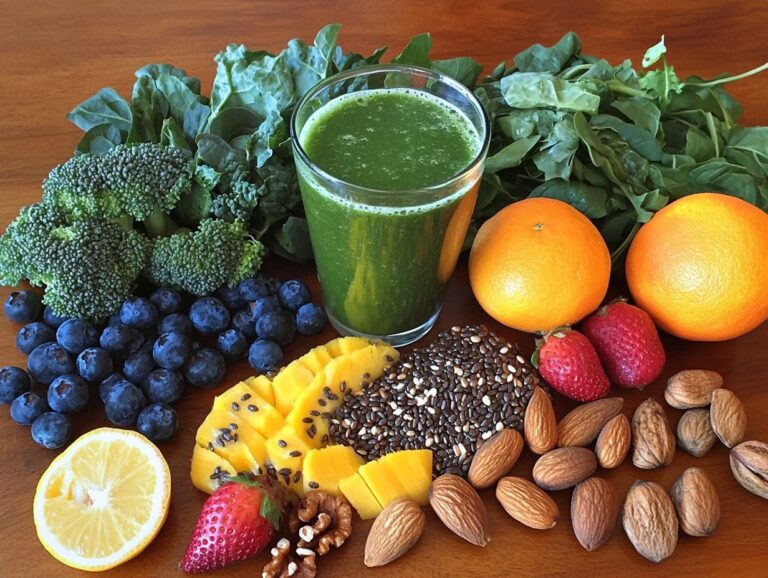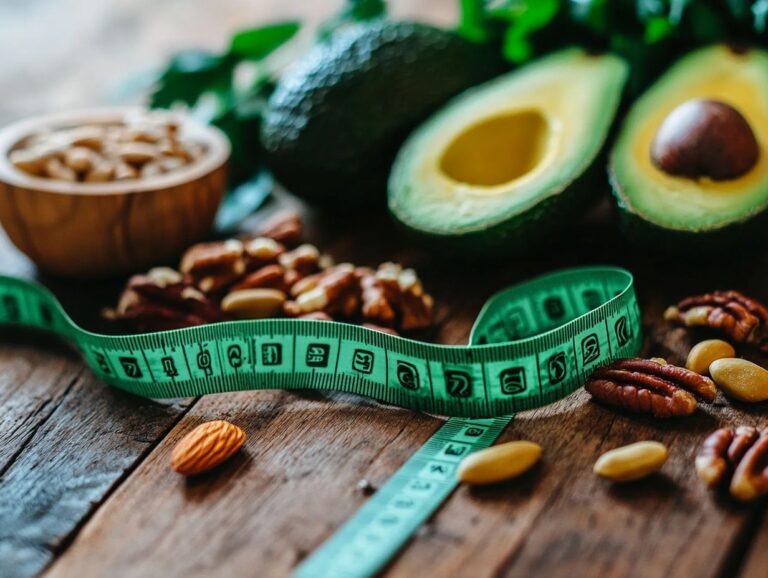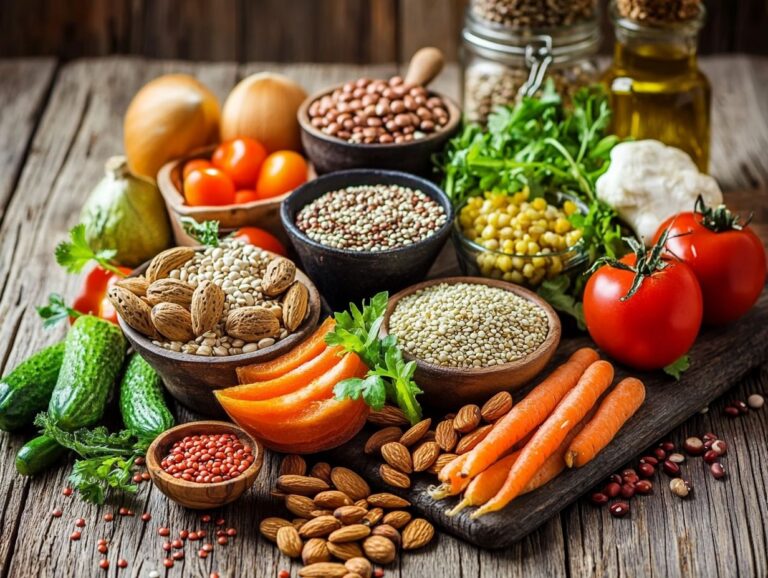Curious about the vegan diet and whether it’s the right choice for you, considering aspects like health benefits and mental health?
This article explores the ins and outs of veganism, highlighting its numerous health, environmental, and ethical benefits, alongside some potential drawbacks like nutrient deficiencies, such as vitamin B12, calcium, and iron deficiencies, and social challenges.
You’ll also find practical tips for transitioning to a vegan lifestyle, ensuring adequate protein intake and mental health balance, and how to assess if it aligns with your personal values and health goals.
Join us as we navigate the complexities of veganism together, with insights from experts like Shereen Lehman and Kristy Del Coro from Verywell Fit!
What Is a Vegan Diet?

A vegan diet is one that excludes all animal products, including meat, dairy, and eggs, and focuses instead on a wide variety of plant-based foods. This lifestyle choice, akin to vegetarianism, has gained popularity in recent years and is often adopted for health benefits, ethical reasons, and environmental considerations.
Individuals who follow a vegan diet prioritize whole grains, fruits, vegetables, nuts, and seeds, ensuring they receive essential nutrients like vitamins and minerals while adhering to their commitment to reducing harm to animals and the planet. As a result, mindful eating and proper meal planning are critical for maintaining a balanced nutritional intake, which includes calcium intake and omega-3 fatty acids.
What Are the Pros of a Vegan Diet?
The advantages of a vegan diet include significant health benefits for both individuals and the environment.
By eliminating animal products, a vegan diet can improve health markers such as weight loss and obesity, while also reducing the risk of chronic diseases like cardiovascular disease and diabetes.
Additionally, the vegan lifestyle addresses ethical concerns, such as minimizing animal cruelty and lowering the environmental impact associated with raising animals for food, which contributes to greenhouse gas emissions and high food costs. This is supported by the reduction of obesity and cardiovascular diseases.
Emphasizing plant-based foods allows for a wide variety of nutritious options that are rich in essential nutrients, including vitamins, minerals, and omega-3 fatty acids.
1. Health Benefits
The health benefits of a vegan diet are well-documented, offering individuals the chance to enhance their well-being by consuming nutrient-dense, plant-based foods, which can also aid in obesity prevention and diabetes management.
Studies have demonstrated that individuals following vegan diets tend to have lower body mass indices, lower cholesterol levels, and a reduced risk of chronic diseases, including obesity, diabetes, cardiovascular diseases, and certain cancers.
By opting for a vegan lifestyle, individuals can significantly improve their overall health and decrease their vulnerability to these health issues.
2. Environmental Benefits
The environmental benefits of veganism are extensive and primarily arise from the significant reductions in greenhouse gas emissions associated with plant-based diets. By choosing plant-based foods over animal products, individuals help decrease the energy and resource demands of meat production, which is a major contributor to deforestation and habitat loss.
Additionally, a vegan diet often leads to lower food costs, as plant-based foods are generally cheaper and more accessible than animal-based options. Research indicates that a shift toward a vegan diet could reduce greenhouse gas emissions by as much as 70% by 2050.
Moreover, the environmental advantages of a vegan diet include water conservation; for instance, livestock farming requires an average of 1,800 gallons of water per pound of beef. A vegan diet also supports increased biodiversity, as ecosystems are given the opportunity to recover from the pressures of industrial agriculture.
Sustainable farming practices that accompany plant-based diets contribute to healthier soils and higher crop yields, ultimately promoting food security. By becoming informed and conscious consumers, individuals can play a crucial role in reducing environmental degradation and fostering the development of more sustainable agricultural practices.
3. Ethical Benefits
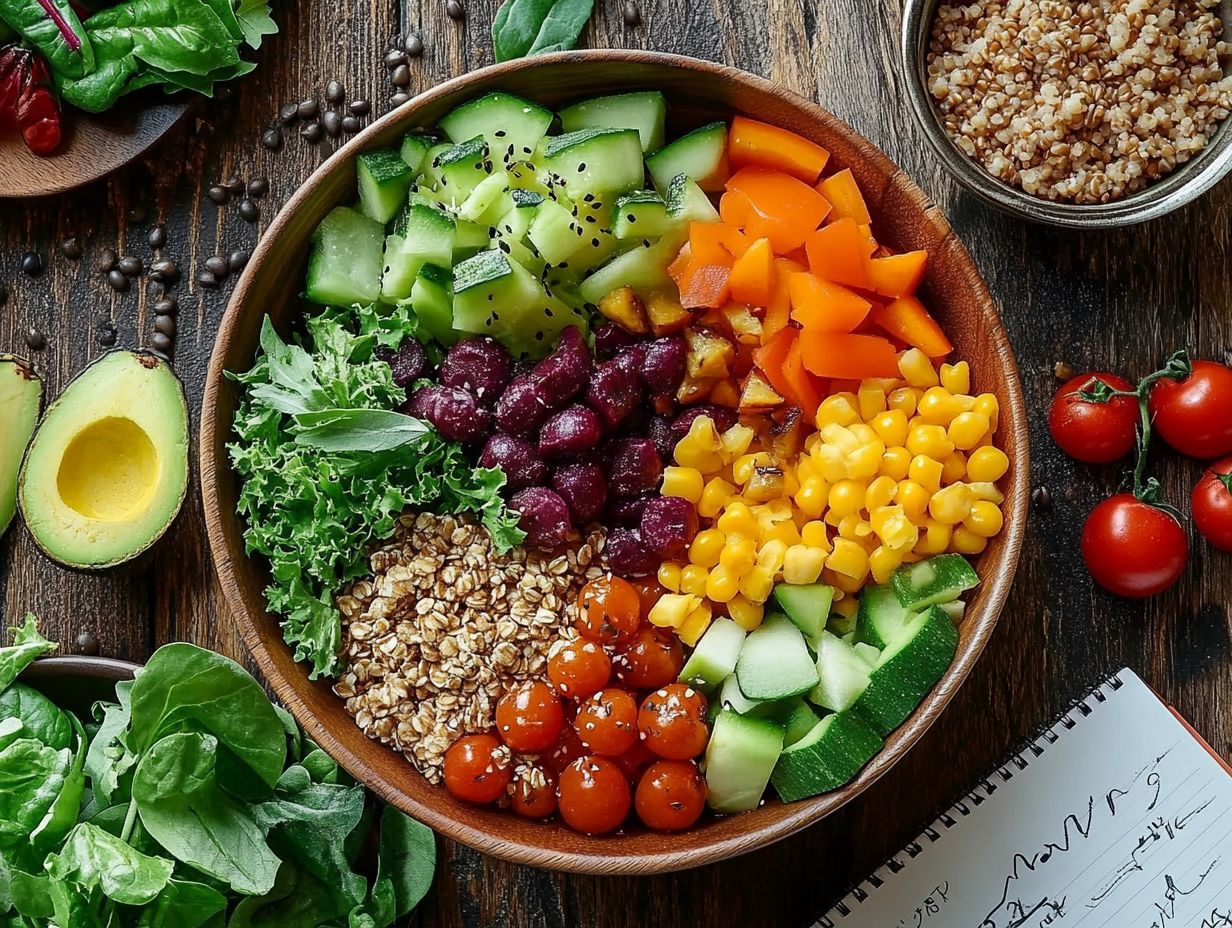
One of the primary ethical benefits of a vegan diet is its conscious opposition to the animal cruelty and exploitation prevalent in many traditional agricultural practices. By eliminating animal products from their diets, vegans actively support the humane treatment and welfare of animals, fostering a compassionate lifestyle that promotes ethical food choices.
This commitment to ethical eating helps build community among those who share similar values regarding animal rights and environmental stewardship. Such solidarity strengthens community ties and encourages activism aimed at raising awareness and driving systemic change.
Veganism also provides individuals with a platform to voice their concerns about practices that harm animals while encouraging others to reflect on the impact of their dietary habits.
Local organizations and online platforms often offer resources for individuals looking to transition to a vegan lifestyle, emphasizing social responsibility and compassion. Through workshops, cooking classes, and outreach programs, these initiatives create a culture of support and give the power toment that extends beyond individual choices, fostering a collective movement against animal exploitation and promoting sustainable practices that protect the planet.
What Are the Cons of a Vegan Diet?
The drawbacks of a vegan diet can pose significant challenges for those considering making the switch.
One of the most notable disadvantages is the risk of nutritional deficiencies, particularly in vitamin B12, calcium, and iron, which are primarily found in animal products.
Additionally, social challenges, such as feeling out of place in non-vegan environments and the perception of limited food options, can discourage people from fully embracing a vegan lifestyle.
1. Nutrient Deficiencies
Nutritional deficiencies pose a significant risk for vegans if they do not adequately plan their diets. Key nutrients such as vitamin B12, which is found exclusively in animal products, as well as calcium and iron, can be challenging to obtain in sufficient amounts from a plant-based diet alone. Therefore, individuals must be diligent in ensuring they receive these essential nutrients.
Plus vitamin B12, deficiencies in omega-3 fatty acids and vitamin D are also significant concerns for this group of eaters. Fortified foods, such as plant-based milks and fortified breakfast cereals, provide excellent options for diversifying food sources and maximizing nutrient intake.
Some nutrients can be difficult to acquire in adequate amounts solely through a plant-based diet, leading many people to turn to supplements for assistance. Vitamin B12 and omega-3 (derived from algae) are among the most commonly taken supplements.
Consulting with doctors, nutritionists, and other healthcare providers is crucial for developing individualized dietary plans that maintain nutritional balance, even within a vegan diet.
2. Social Challenges
Social challenges are common difficulties faced by those transitioning to a vegan lifestyle, as many individuals experience feelings of social isolation when adopting a plant-based diet. This isolation can be especially pronounced during meals with non-vegan friends and family or in non-vegan settings, making these occasions uncomfortable and exclusionary. As a result, many people seek community support through local vegan groups and online forums.
Those who choose to go vegan may encounter curiosity or judgment from others, potentially leading to awkward moments or misunderstandings in social situations.
To address these social challenges, it can be beneficial to engage in community activities related to veganism. Creative meal planning for social gatherings can foster togetherness and help build a sense of community, ensuring that no one feels left out.
Open discussions about dietary preferences can contribute to a loving and understanding atmosphere, providing opportunities for both vegans and non-vegans to learn from one another and explore the exciting world of plant-based food together.
3. Limited Food Options
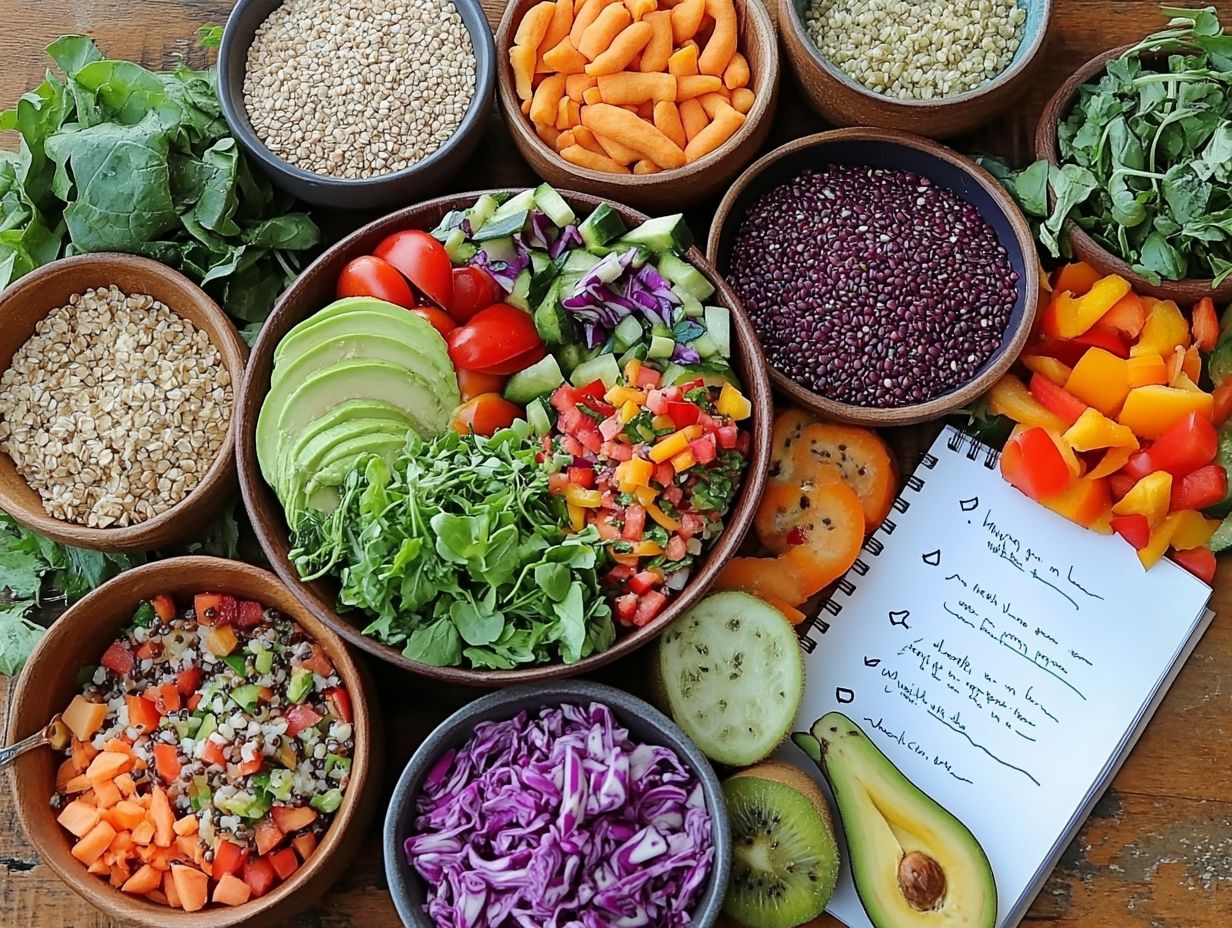
Limited food options present significant challenges for those following a vegan diet, especially in areas with fewer plant-based alternatives. These limitations can complicate meal planning and necessitate creativity and resourcefulness in sourcing diverse and nutritious ingredients to avoid meal monotony.
To address these challenges, individuals can explore local farmer’s markets or community-supported agriculture programs for fresh produce and new flavors. Additionally, online platforms dedicated to plant-based diets offer a plethora of creative and unique recipes that make meal preparation both enjoyable and fulfilling.
Experimenting with different cooking methods and spices can enhance both the taste and nutritional value of meals. By embracing culinary creativity, limited options can transform into a wide variety of healthy and satisfying meals.
How to Transition to a Vegan Diet?
The following methods can facilitate a smooth transition to a vegan diet:
- Move Slowly: The best approach is to transition gradually. Start by slowly replacing animal products with a diverse array of plant-based foods. This method helps ensure that you maintain a well-balanced nutritional intake.
- Avoid Processed Foods: It is important to steer clear of highly processed substitutes for animal products, as they may lack nutritional value and fail to satisfy cravings.
- Practice Mindful Eating: Incorporating mindful eating practices, such as meditation, journaling, and paying attention to your body’s hunger signals, can support the transition to a vegan diet.
- Seek Community Support: Engaging with community support networks, including local vegan restaurants, online support groups, and social media pages, can enhance your experience and make the transition more enjoyable.
1. Start Slowly
Starting slowly is essential for anyone adopting a vegan diet. A gradual transition allows for a smoother and more sustainable adjustment to new dietary habits, similar to those experienced in a vegetarian diet.
Instead of making drastic changes all at once, individuals can begin by incorporating more plant-based meals into their weekly routine while slowly reducing their intake of animal products. This approach helps minimize feelings of deprivation and enhances overall satisfaction with the new diet.
For example, one might start with “Meatless Mondays” or replace one animal-based meal each day with a delicious plant-centered option. This method reduces the shock of sudden dietary changes while introducing a delightful variety of flavors and textures to meals, promoting an exciting food variety.
It is also important to ensure that meals are balanced and nutritionally diverse by consistently including grains, legumes, fruits, and vegetables.
To facilitate this transition, effective meal planning can be beneficial. Preparing a weekly menu, creating shopping lists, and experimenting with new recipes can make the transition more enjoyable and less daunting, encouraging individuals to fully embrace their new eating habits, potentially leading to reduced food costs.
2. Educate Yourself
Understanding nutrition is a crucial step when adopting a vegan diet, as it enables individuals to identify the vitamins and minerals they may need to supplement in their new lifestyle, such as vitamin B12.
By learning which plant-based foods provide adequate protein, calcium, iron, and other essential nutrients, one can make informed food choices and simplify meal planning, thereby reducing the risk of nutritional deficiencies.
Numerous resources are available to support this educational journey, including:
- Books on vegan nutrition science by authors like Shereen Lehman and Kristy Del Coro
- Reputable websites such as Verywell Fit featuring articles and recipes for a plant-based diet, published on December 21, 2021
- Nutrition courses focused on veganism
These resources emphasize the importance of meal balance and knowledge of key nutrient sources, ensuring that one’s health is maintained on a compassionate and sustainable diet. Consulting healthcare professionals can also provide personalized guidance.
3. Find Support
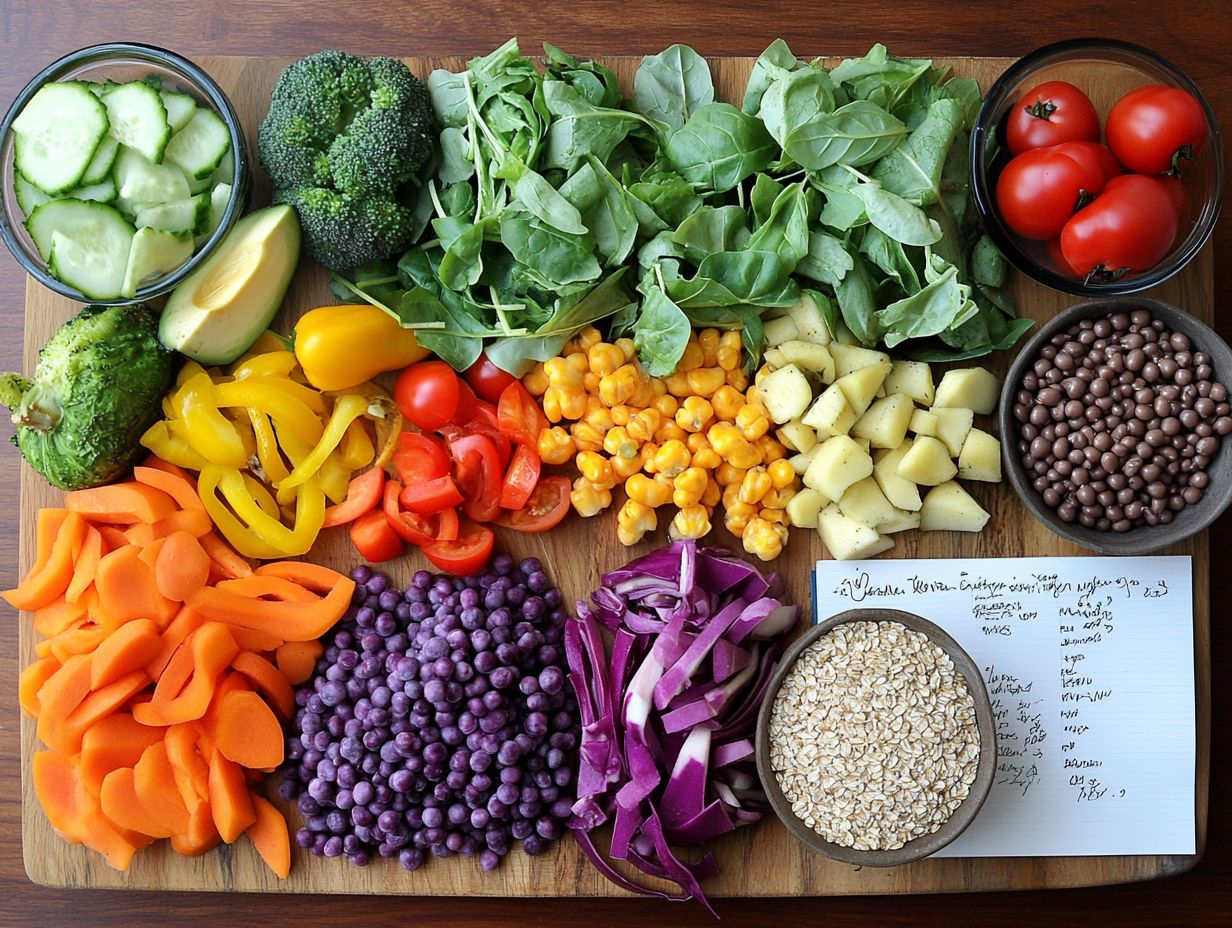
Support is essential when transitioning to a vegan diet, as it helps individuals navigate the social and nutritional challenges they may encounter.
Community support can take the form of in-person local groups, online forums, and social media pages that offer camaraderie as well as valuable resources, including recipes, meal planning tips, and encouragement from others with similar goals.
By connecting with individuals on similar journeys, those making the switch can share their experiences and learn from one another, which significantly reduces the learning curve. Discussing challenges such as cravings or social situations involving food can provide insights into effective strategies that have worked for others.
Additionally, sharing victories—no matter how small—can help maintain motivation and foster a positive atmosphere. Support not only offers accountability but also enriches the overall experience.
Is a Vegan Diet Right for You?
The decision to follow a vegan diet depends on an individual’s health objectives, ethics and beliefs, as well as their access to the resources needed to successfully maintain a vegan lifestyle.
For some people, the health benefits of veganism, such as weight loss and improved mental well-being, may align perfectly with their goals. For others, ethical concerns related to animal cruelty and the reduction of greenhouse gases may motivate them to adopt a plant-based diet. Vegan mothers, in particular, may find a vegan diet beneficial for setting a compassionate example while ensuring nutritional adequacy for their families.
1. Consider Your Health Goals
When determining whether a vegan diet is suitable for an individual, it is essential to consider one’s personal health goals. Research indicates that for those aiming for weight loss, adopting a vegan diet can be beneficial due to its emphasis on whole foods, lower calorie intake, and improved nutrient density.
Additionally, studies show that plant-based diets are strongly linked to enhanced mood and cognitive function, making them a good option for individuals looking to improve their mental health. Furthermore, the vegan lifestyle is effective in preventing chronic diseases; it has been shown to lower the risk of heart disease, diabetes, and certain cancers, while being rich in antioxidants and vitamins that promote overall health.
Taking these factors into account can help individuals make informed decisions about dietary modifications based on their specific health objectives. Ultimately, recognizing one’s health goals when considering a vegan diet fosters an awareness of how dietary choices can be tailored to meet individual needs.
2. Assess Your Values and Beliefs
Evaluating personal values and beliefs is essential when deciding to adopt a vegan diet, as this lifestyle is often tied to strong convictions regarding animal rights and environmentalism.
Many individuals choose a vegan lifestyle due to their opposition to animal cruelty and their desire to mitigate the environmental impact of animal farming. Therefore, it is crucial to reflect on how these issues align with your own values.
Taking the time to contemplate what matters most to you can lead to deeper insights into your personal motivations, which may not be immediately apparent. This reflection can foster a greater appreciation for how your principles are reflected in your food choices.
For some, embracing a vegan lifestyle serves as a powerful advocacy tool for animal rights and a way to positively affect the planet. As individuals consider these factors, they may feel more inspired to experiment with plant-based meals and to recognize the impact of their diet on both their health and the health of the planet.
3. Evaluate Your Access to Resources
Evaluating your access to resources is a crucial step in determining whether a vegan diet is feasible and sustainable for you. Factors such as the availability of plant-based foods, local grocery stores, and meal planning resources can significantly impact your ability to maintain a balanced vegan diet and your overall satisfaction with this lifestyle change.
Understanding which ingredients you can easily source will not only assist in meal planning but also reduce the frustration that often accompanies searching for specialty items. Exploring local farmers’ markets and health food stores can introduce you to fresh, seasonal produce that enhances your meals.
It is essential for individuals to assess their communities for vegan-friendly restaurants or cafes that can provide inspiration and convenient dining options. By considering these factors and planning ahead, you can create a fulfilling and diverse menu, making the transition to a vegan lifestyle both enjoyable and sustainable.
